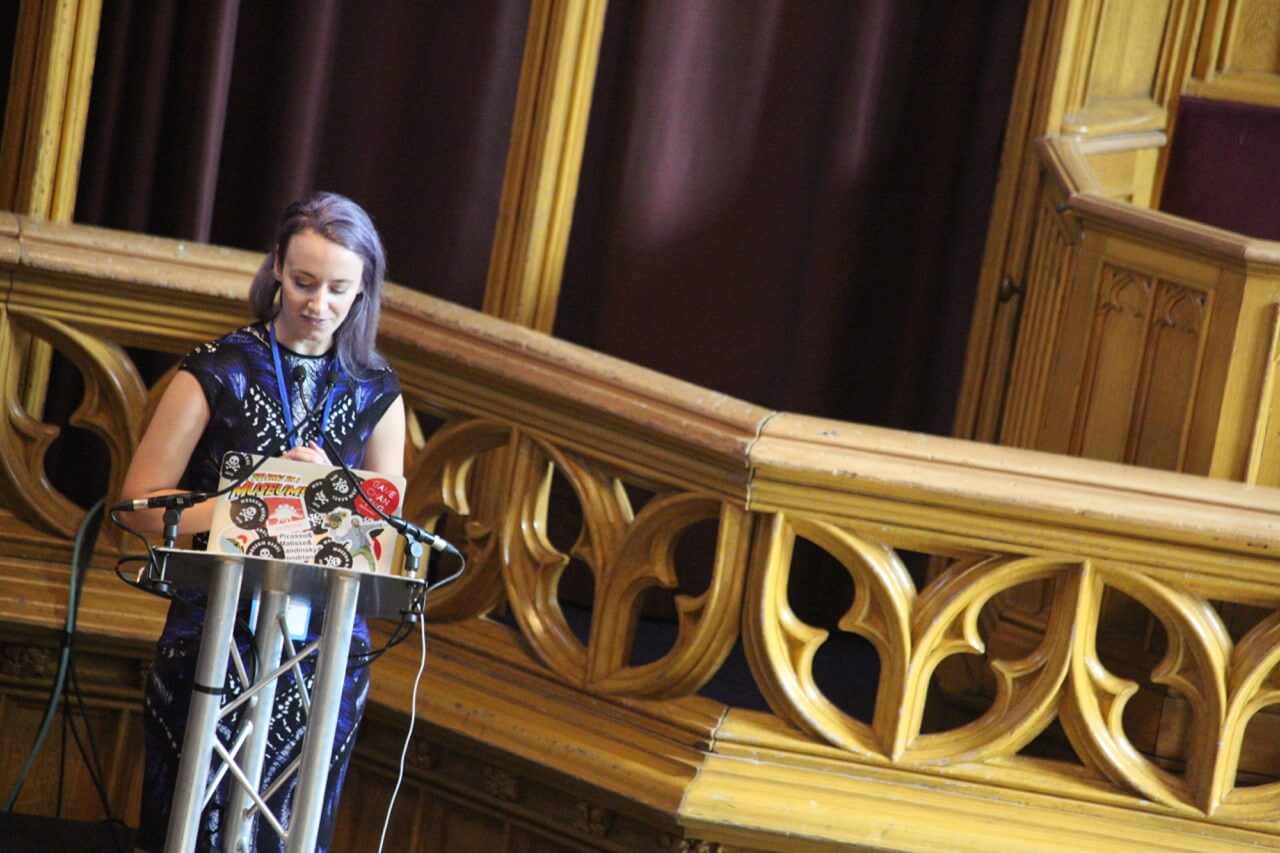I'm an introvert and I gave a conference talk
I gave my first conference talk at Design It Build It conference in September this year. After my talk, an attendee invited me to connect on LinkedIn and in his message to me, asked how I had overcome being an introvert to give my talk.
And while I understood the sentiment, I want to be clear: I didn’t overcome being an introvert in any way but have been on a very long and winding journey since autumn of 2016 that encompasses fundamentally understanding what it means to be introvert and embracing that.

Photo: Jim Richardson DiBi organizer
Some background #
I was 8 months into my role at Microsoft on the Edge team when I had the opportunity to go to Grace Hopper in Houston in the autumn of 2016. My experience as a whole wasn’t stellar. I didn’t really feel connected to any of the Microsoft employees there even though we had a huge presence, so I felt pretty alone for the few days I was there. Through the loneliness though, the experience was worth it for one session I attended.
Susan Cain, the author of Quiet: The Power of Introverts, was giving a talk on introverts. It was a life-changing session for me.
She went into the scientific details of how the brain of introverts are wired differently from those of extroverts. She also talked about the misconception that introversion means you are shy. Introverts are more often shy, but it’s not necessarily a defining feature. (I was extremely shy and have improved my social skills over the last few years.)
In her 50-minute session, I suddenly connected all these dots to different things I’d experienced in my life as far back as grade school. Something wasn’t in fact wrong with me, the world has just catered to extroverts up until recently. I have memories from grade and high school that haunt me to this day because I couldn’t articulate something thoughtfully on the spot. Introverts require time to digest things, mull things over. I wanted to cry, because everything suddenly made so much sense.
As it turns out speaking is actually suited for introverts – as I wrote my talk, I was able to thoughtfully craft my story and what I wanted to tell. It was perfect really. As a speaker, afterwards, people would come up to talk to me about my talk and I at least had something I could talk about. I feel I’m really quite terrible one on one and would much prefer a deeper conversation than small talk.
All that was left was to get over the fear of public speaking, which is no small feat. A year ago, I was pretty content in my decision to never speak at a conference. It wasn’t in the cards, I told myself. A year and a half previously I was supposed to do a co-presentation and had such a severe panic attack I dropped out of it. I wasn’t even really necessary for the talk so it was fine, but I still felt like a little bit of a failure for backing out. I accepted it and moved on. I found joy in attending conferences that Edge was sponsoring and being the booth person that developers would come talk to.
This was again another thing that helped me along my path: I found I enjoyed standing at the booth talking to people because I knew what my goals were and what I was supposed to be asking. So little by little, just talking to people didn’t intimidate me so much. Even though I was exhausted at the end of the day, I felt accomplished and enjoyed the connections I would make even if they were brief.
The CFP for DiBi #
My journey to my first conference talk began when the CFP for the conference came through in the spring. DiBi had been on my list because it was in Scotland so I was signed up to receive emails. The conference theme for 2019 was luck and the presentation time was 20-30 minutes. I paused when I saw that and thought, “I have a story about luck and my career that I could fill 20 minutes with…and it’s in Edinburgh, my favorite city….yeah I could do that.”
It started with simply believing I could do it, and when my talk was accepted…my heart jumped. I absolutely could do this and there was no backing out now. I wrote out my entire talk by the end of June. I made revisions up until two weeks before the conference in September. I would think of two of my female coworkers and tell myself, “They can do it…so I know I can do it.”
But it wasn’t just the fact that I practiced my talk every day for two months. While preparation is key, the past year has been a year of tremendous personal growth for me – it has been tumultuous and there have been tears and frustration and panic, unrelated to any conference talk. And I know I’ve come out stronger because of it. This coupled with Mindfulness training I have been taking at Microsoft, run by my former manager, has been a tremendous help to myself.
I had already overcame so much, this just felt like the right hill to climb at the time. The conference was in a city I loved, with an audience I felt I was connected to, and I had a story to tell so this was the right conference to start with. I knew it in my gut.
The mind of an introvert #
I recently learned that self-compassion or self-care can fundamentally re-wire your brain to build self-confidence. Instead of being hard on yourself, talk to yourself like you would a friend. As I practiced my talk, I would stumble and mess up or have to start a slide over...I took care to not be hard on myself. I took care to be kind. I stopped and took a breath and gave myself a little self-love.
The first part of being an introvert is accepting you are one and that a fundamental part of surviving as one, is learning what form of self-care you need.
Introverts require recharging after group events because of the way we process everything happening around us drains us. I notice this the most when I am with my rambunctious group of best friends. They are loud and brash and funny, I love them dearly, but I tend to notice everything happening in the background: the 15 different side conversations, the dancing, the music…I process it all. Rather than keep up, I now know when I need to call it a night. I remove myself and find quiet. It’s trusting myself to know what I need and when to stop.
As for public speaking – for me, it was about finding my support network: my coworkers that sat through my dry-run and my friends outside of work, who built me up in the week before the conference, the ones who let me express my jitters (almost everyday) and gave me shoe advice when I couldn’t figure out which pair of shoes to go with the dress I bought. (Yes, I bought a dress just for the conference.) The support network was another piece of care I identified that I needed in order to get through things.
I was still nervous the day of the talk: I could barely eat breakfast and my talk was the first one after lunch, so I couldn’t stomach lunch either. But I had spent months preparing for this moment and as I was three quarters of the way through my talk, a little voice in my head went: “you’re almost done!” I learned that nerves are normal, that that part of public speaking never really goes away. It’s important to acknowledge them as they come up and sit with them and then let them go.
And then this is where that self-care and self-compassion comes in even more. I left the conference at the end of the day and wandered down the Royal Mile to find some food and a cider and sit by myself to decompress. This was a big accomplishment and the jitters had absolutely taken a physical toll on me that day and it was okay to not go to the sponsored party after.
It’s okay to know your limits and say no.
Be kind #
Be compassionate to yourself and you’ll find you can go farther than you think. That might sound a bit cheesy, and it probably is, but it’s the truth. Self-care, mindfulnesss training, and trusting the people around me got me to my first talk and through it.
No one came up afterwards with harsh or cruel words, everyone was kind online. One thing someone told me when I asked Twitter for public speaking tips was how the audience isn’t your enemy, no one wants you to fail. And I felt that energy in the room.
So to the kind fellow who asked me how I overcame introversion…my answer to you is this: I didn’t.
I embraced it because it is fundamentally a part of who I am: it is quite literally wired into my brain. Pretending to be someone I’m not was never an option, and that’s what I missed the first time around when I dropped out of that co-talk. I was fighting myself instead of working with it. And now that I know what I need, I am well-equipped to take on any challenge large or small.
I don't have comments enabled on here yet (my to-do list is astounding), but you can let me know your thoughts on Twitter. I'm on there far too often.
